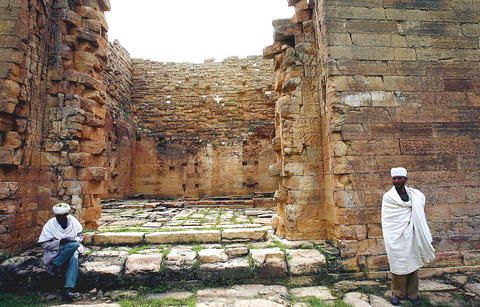Seven years, seven months and seven days after the chagrin surrounding Y2K came and passed, Ethiopia - which uses an archaic 13-month calendar - is set to party like it's 1999.
Today at midnight, the Horn of Africa country will welcome its third millennium with concerts and other events, as their calendar - similar to the Julian one discarded hundreds of years ago by the Western world - reaches the year 2000.
But the joy of the celebrations is tarnished by Ethiopia's growing reputation as an abuser of human rights and by the government's stepping up of security to thwart what it says may be attacks by various rebel groups in the country.

PHOTO: EPA
"Though we Ethiopians want to celebrate in as free a manner as possible, there are those who want to cause problems here and there," said Mulugeta Aserate Kassa, spokesman for the millennium secretariat which is organizing the festivities.
He added that heightened security would be deployed at events across the country. "The celebrations will go on, come what may," he said.
Ethiopia faces threats by a handful of rebel groups, most prominently the ethnic-Somali Ogaden National Liberation Front (ONLF), a militant group that seeks independence.
The government has accused the ONLF of attacking a Chinese-owned oil firm earlier this year, which resulted in the deaths of 74 people and also for a smaller attack on national holiday celebrations in the Ogaden - a charge it denies.
Addis Ababa says it is vulnerable to an attack during the millennium party, ironically on the same day as the bombings in New York City.
"Elements will try to disturb these millennium celebrations, but by this time the government has finished every preparation to ensure they are peaceful," said Zamedkin Tekle, spokesman for the Ministry of Information, who did not give details of security set to be deployed in the capital.
And while Ethiopia may try to paint a rosy picture of itself through the festivities, a scrutinizing eye is upon it: international aid agency Medecins Sans Frontieres charged that the government has burned villages and sent civilians fleeing in the Ogaden, while the UN sent a fact-finding mission there last week to investigate.
The government began waging a campaign this year to root out ONLF rebels with civilians often caught in the operations.
Beyond the spotlight on Ethiopia's human rights record, the country, known most for its 1984 famine, is set to throw a wild and extravagant party.
The concert at the newly constructed Millennium Central Hall - which will feature US group Black Eyed Peas as well as local musicians - is set to draw up to 20,000 people. African heads of state are set to attend with a government inaugural ceremony opening the show.

April 28 to May 4 During the Japanese colonial era, a city’s “first” high school typically served Japanese students, while Taiwanese attended the “second” high school. Only in Taichung was this reversed. That’s because when Taichung First High School opened its doors on May 1, 1915 to serve Taiwanese students who were previously barred from secondary education, it was the only high school in town. Former principal Hideo Azukisawa threatened to quit when the government in 1922 attempted to transfer the “first” designation to a new local high school for Japanese students, leading to this unusual situation. Prior to the Taichung First

The Ministry of Education last month proposed a nationwide ban on mobile devices in schools, aiming to curb concerns over student phone addiction. Under the revised regulation, which will take effect in August, teachers and schools will be required to collect mobile devices — including phones, laptops and wearables devices — for safekeeping during school hours, unless they are being used for educational purposes. For Chang Fong-ching (張鳳琴), the ban will have a positive impact. “It’s a good move,” says the professor in the department of

On April 17, Chinese Nationalist Party (KMT) Chairman Eric Chu (朱立倫) launched a bold campaign to revive and revitalize the KMT base by calling for an impromptu rally at the Taipei prosecutor’s offices to protest recent arrests of KMT recall campaigners over allegations of forgery and fraud involving signatures of dead voters. The protest had no time to apply for permits and was illegal, but that played into the sense of opposition grievance at alleged weaponization of the judiciary by the Democratic Progressive Party (DPP) to “annihilate” the opposition parties. Blamed for faltering recall campaigns and faced with a KMT chair

Article 2 of the Additional Articles of the Constitution of the Republic of China (中華民國憲法增修條文) stipulates that upon a vote of no confidence in the premier, the president can dissolve the legislature within 10 days. If the legislature is dissolved, a new legislative election must be held within 60 days, and the legislators’ terms will then be reckoned from that election. Two weeks ago Taipei Mayor Chiang Wan-an (蔣萬安) of the Chinese Nationalist Party (KMT) proposed that the legislature hold a vote of no confidence in the premier and dare the president to dissolve the legislature. The legislature is currently controlled